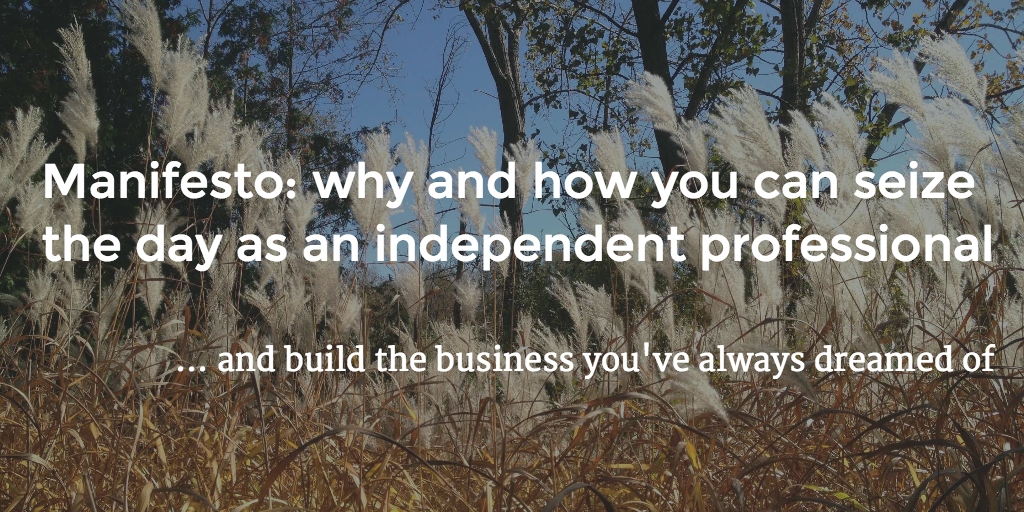“When are you going to get a real job?” Every independent business professional has been asked this question. Maybe it was asked by your prospective love interest… or your in-laws… or maybe you were asking yourself. It might have been after you failed to land a client, or lost one, or just had a bad quarter. A steady paycheck looks good at such times.
I know that feeling. I’ve had a real job. Several. My most recent job was the best one I’ve ever had, and it still had its, well, limitations. I was way too vulnerable to other people telling me what work to do, and whether I’d be able to go on doing it.
The time is right for the skilled independent professional to spread his/her wings.This post talks about why this is the time to seize the day, and gives you some ideas on how to do that.
This is the start of what I’m calling The Independent Thought-Leader’s Manifesto. I’ll develop the idea more over time – this is just me putting the idea out there, and hope that you’ll be able to contribute to the concept. All ideas welcome.
How the “long tail” lets you focus on the work you love
To start with, here’s why the time has never been better to create and grow a business on a breathtakingly narrow specialty – one that you just happen to love.
As an example: I work with a client we’ll call Dieter, who has major experience as a manager on large construction projects. That’s nothing unusual – there are a lot of such professionals out there. He’s also experienced in helping companies reduce their energy consumption. Again, many business professionals can conduct energy audits. But it’s Dieter’s intersection of those two aspects that makes him particularly valuable to a narrow range of clients – those who want his help in implementing energy projects. Knowing what can go wrong in an energy installation, and preventing those problems, is a rare skill.
But the challenge facing Dieter is that the opportunities to exercise his full skill in this area are equally rare. There simply aren’t many energy management projects big enough to warrant his skills and hourly rate. He’s told me that he can do energy audits, but that’s a commodity service, and too many other consultants with that skill are driving down the rates for the work.
Ten or 20 years ago, Dieter would have had to rely on trade magazine ads, word of mouth, cold-calling and direct mail to connect with organizations that need his narrow skill-set. And, organizations needing Dieter’s skills would have had trouble finding him.
But now, the “long tail” effect comes into play – the ability of the Internet to connect niche products and services, to narrowly-defined markets. This is a huge change. At no time in history has it been possible to have a service that’s of interest to just a tiny number of people, and be able to narrow-cast a “Dieter’s” message so it reaches that niche market.
Building trust from a distance, through content
In a word, it’s about “content.” Content marketing involves creating helpful information and making it freely available. People accessing the content come to see the provider as a good source of information, and it’s a short step from there to becoming a trusted service provider or vendor.
It’s an old-new thing. Many of the ancient Greek philosophers, wrote books to promote their own schools. Machiavelli wrote “The Prince” largely to market his skills as a political consultant in Renaissance Italy. And marketing consultants today, like Amy Porterfield, are always talking about new social channels.
Easy to develop content: Computers today offer an ease of use that makes it possible for anyone to produce credible content – they even check your spelling and grammar. Even a standard consumer-level camera, or a smartphone, can produce presentable video and audio recordings. Those can then be easily edited with standard software.
Easy to make content available: A host of free, public platforms allows you to publish your content. For video, there’s YouTube, Vimeo, SlideShare and others. You can put your blog onto Blogger as well as host it on your own domain, using a free Wordpress template. SoundCloud will host your audio podcasts for free. There are also paid platforms.
Easy for clients/prospects to find: Search engines have moved way past the clunky Boolean protocols, so that now just typing a phrase into a search box yields a wide range of results.
Easy to share/promote your content: You can easily promote your content on platforms like LinkedIn and Twitter.
All of this makes it possible for someone in a distant location to connect with your content, and come to understand what you do and trust you, even without meeting you. And that is huge, particularly for people with really narrow skills to offer.
That’s a start, where’s the rest of it?
That’s why I think that the time is now to start growing your niche practice. Based on reader feedback, and further thoughts, I’m going to expand the idea of an independent thought-leader’s manifesto, which I hope will inform and inspire.So, think about it.
- If you’re an independent consultant, what work are you doing now that you find boring, or problematic, and you’d love to ditch if you could afford to?
- What do you really want to do? What ideal clients do you want to serve, and how do you really want to serve them?
- What topics can you discuss, that can show your ability to help your ideal clients solve the issues you really want to solve for them?
- And what’s your next step for building the future you want to build?


